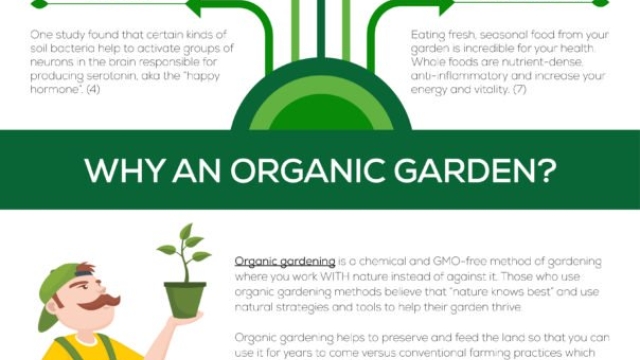
Organic gardening has become a popular practice, drawing both seasoned gardeners and beginners alike. The allure lies in its commitment to sustainability and the use of natural methods. As we delve into this enlightening world, it’s essential to understand its principles and techniques. At the heart of organic gardening is a desire to work harmoniously with nature, fostering healthy soil, vibrant plants, and a fruitful harvest. In this article, we will uncover the secrets to flourishing in the art of organic gardening, guiding you on a journey of cultivating your own organic oasis.
Kellogg Garden Products has operated as a family-owned and operated company for four generations. With a rich history rooted in the passion for organic gardening, they have honed their expertise, developing high-quality products that nourish the soil and promote plant growth. Their commitment to sustainability aligns perfectly with the principles of organic gardening, and their diverse range of offerings caters to the specific needs of every gardener, from the seasoned horticulturist to the green-fingered novice. Throughout this article, we will explore the valuable insights and products provided by Kellogg Garden, helping you pave the way towards a thriving organic garden. So, let’s roll up our sleeves and embark on this exciting journey of discovery together.
Benefits of Organic Gardening
Organic gardening offers a myriad of benefits that not only contribute to our personal well-being but also have a positive impact on the environment. By embracing organic gardening practices, we can create a harmonious balance between nature and our own desire to cultivate beautiful and bountiful gardens.
Healthier Plants and Produce:
Organic gardening methods prioritize the use of natural fertilizers and pesticides, allowing plants to grow and develop in their most natural state. These practices promote the growth of stronger and more resilient plants, resulting in healthier and more nutrient-rich produce. Embracing organic gardening means enjoying the fruits of our labor that are free from harmful chemicals and synthetic additives.Environmental Sustainability:
One of the core principles of organic gardening is environmental stewardship. By avoiding the use of synthetic fertilizers and harmful pesticides, we reduce the overall impact on the environment. Organic gardening encourages the preservation of soil health, resilience in the face of pests and diseases, and the conservation of water resources. It is a holistic approach that seeks to work in harmony with nature rather than against it.Supporting Biodiversity:
Organic gardening provides a sanctuary for a wide variety of plant and animal species. By avoiding the use of chemical pesticides and herbicides, we protect the delicate balance of ecosystems within our gardens. This, in turn, fosters the presence of beneficial insects and pollinators, contributing to the overall health and biodiversity of our surroundings. Organic gardening becomes a means of not only cultivating beautiful landscapes but also supporting the natural world around us.
In conclusion, organic gardening offers a range of benefits that extend beyond just the plants we cultivate. It allows us to create nurturing environments that are conducive to the growth of healthier plants, while also promoting sustainability and biodiversity. By embracing organic gardening, we can unravel the secrets to flourishing gardens and forge a deeper connection with nature.
Kellogg Garden Products: A Legacy of Excellence
When it comes to organic gardening, few companies can match the legacy of Kellogg Garden Products. As a family-owned and operated company, Kellogg Garden Products has deep roots that span four generations. With a commitment to excellence and a passion for organic gardening, they have established themselves as leaders in the industry.
Founded in [insert year], Kellogg Garden Products began as a small venture and has since grown into a renowned name in the organic gardening community. Their dedication to providing high-quality products and promoting sustainable practices has earned them a well-deserved reputation for excellence.
What sets Kellogg Garden Products apart from other companies is their unwavering focus on organic gardening. They understand the significance of using natural, chemical-free methods to nurture the soil and cultivate healthy plants. Their extensive range of organic fertilizers, composts, and soils are carefully formulated to enrich the garden while minimizing harm to the environment.
With each generation, Kellogg Garden Products has built upon their expertise and continued to innovate in the field of organic gardening. They have invested in research and development to consistently improve their products, ensuring that gardeners have access to the best resources for their organic gardens.
In conclusion, the legacy of Kellogg Garden Products is one of excellence and commitment to organic gardening. Their family-owned and operated business has flourished for four generations, driven by a passion for sustainability and promoting healthy, vibrant gardens. With their range of organic products and ongoing dedication to innovation, Kellogg Garden Products remains at the forefront of the organic gardening industry.
Tips for Mastering the Art of Organic Gardening
Choose the Right Soil: A key aspect of successful organic gardening is starting with healthy soil. Soil rich in organic matter and nutrients provides the foundation for thriving plants. Consider using ‘Kellogg Garden’ Products, a trusted family-owned and operated company with decades of experience in producing quality organic gardening products. Their wide range of soil amendments, composts, and fertilizers can help you create a nutrient-rich environment for your plants to grow and flourish.
Nurture Biodiversity: Creating a diverse ecosystem in your garden is essential for organic gardening. By attracting a variety of beneficial insects, birds, and other wildlife, you can naturally control pests and promote pollination. Incorporate native plants, wildflowers, and flowering herbs to provide food and habitat for beneficial creatures. Avoid harmful pesticides and instead focus on attracting natural predators to maintain a healthy balance in your garden.
Practice Composting: Composting is a fundamental practice in organic gardening. It allows you to recycle kitchen scraps, yard waste, and other organic materials into nutrient-rich compost that can be used to fertilize your plants. ‘Kellogg Garden’ Products offers composting solutions such as their specialized composters and compost soil amendments, making it easier for you to start composting and enrich your garden naturally.
What To Plant In March Zone 8
Remember, organic gardening is not simply about what you avoid using (such as synthetic chemicals or genetically modified organisms), but also about actively nurturing and improving the health of your garden ecosystem. By following these tips, you can unlock the secrets to successful organic gardening and create a vibrant and sustainable garden.


